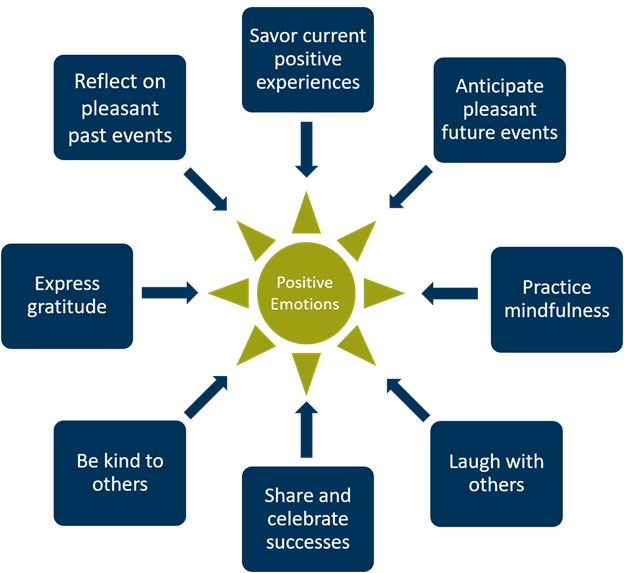The Power of Positive Emotions
Boost Your Well-Being with Positivity
Popular psychology builds up the power of positive thinking. However, the link between positive emotions and well-being is more complicated than just “thinking positive”. It is grounded in psychological theory and literature. Research suggests that experiencing positive emotions is associated with a host of benefits beyond feeling pleasant in the moment[i].
The effects of positivity include better
health, reduced stress, and even greater longevity[ii]. According
to the Broaden-and-Build Theory[iii],
simply experiencing positive emotions can improve physical and psychological
well-being. Cultivating positive emotions “broadens” your perspective and
“builds” your personal resources, making it easier to cope with stress.
Positive emotions can also “undo” negative emotions by increasing how quickly
your body recovers from stressful events. A
positive experience sets your expectations for further positivity in the
future, which, combined with mindfulness, can create an upward spiral with
lasting beneficial effects[iv].
Cultivate Positive Emotions
People are not passive recipients who simply react to their emotions and environment, although it sometimes seems this way. Instead, we can influence our reactions to the world around us. As such, it is possible to engage in behaviors that promote positive emotions. Outlined below are some science-based strategies for cultivating and prolonging positive emotions in both the short- and long-term.
Be Kind to Others
Although the focus of most advice on positive emotions is on the self, recent research shows that doing things that benefits others can result in increased positive emotions and decreased negative emotions[v]. Even doing a good deed for society, such as volunteering, can promote positive emotions and well-being[vi]. Kindness can also be as simple as asking others how they are doing, giving compliments or spreading positive news, or sharing a laugh with friends or coworkers.
Count Your Blessings
One way to promote and sustain positive emotions is through regularly expressing gratitude. Gratitude involves reflecting on the many things in life that you are thankful for, such supportive relationships with others or opportunities you have had[vii]. Consider reflecting on what you’re grateful for with a gratitude journal, and refer back to journal entries when you need a positive boost. Share successes with others to spread the positivity.
Stop and Smell the Roses
Happier people find positivity even in ordinary events, such as finding beauty in a sunset or enjoying the warmth of the sun on their skin, and being mindful of pleasant experiences. A hallmark of both positivity and emotional intelligence is to make the most out of a situation and the emotions that arise. Use mindfulness, gratitude, and meditation to help you savor positive emotions and experiences, and to find the silver lining when times are tough.
Engage in Mental Time Travel
In addition to focusing on present positive experiences, positive emotions can also be prolonged by reflecting on positive past events, or by anticipating positive future events. This is called positive mental time travel. Reflecting on past positivity is linked to better emotional well-being and increased life satisfaction[viii].
Practice Mindfulness
Mindfulness is a way of paying attention to what’s happening in the present moment with an open mind and an attitude of non-judgment. In addition to promoting positive emotions, mindfulness has been linked to a host of benefits, including reduced stress, improved attention, and increased resilience. Make a habit of mindfulness practice with online tools and guided meditations.

How SIGMA Can Help
Mindfulness and positivity lead to a more fulfilled sense of well-being. SIGMA can help you develop your mindfulness with in-person mindfulness workshops, online training that can be done at your own pace, and one-on-one coaching. To learn more about how mindfulness training could help cultivate positive emotions, contact us today.
[i] Tugade, M. M., Fredrickson, B. L., & Feldman Barrett, L. (2004). Psychological resilience and positive emotional granularity: Examining the benefits of positive emotions on coping and health. Journal of Personality, 72, 1161-1190. doi:10.1111/j.1467-6494.2004.00294.x
[ii] Okely, J. A., Weiss, A., & Gale, C. R. (2017). The interaction between stress and positive affect in predicting mortality. Journal of Psychosomatic Research, 100, 53-60. doi:10.1016/j.jpsychores.2017.07.005
[iii] Fredrickson, B. L. (2001). The role of positive emotions in positive psychology: The broaden-and-build theory of positive emotions. American Psychologist, 56, 218-226. doi:10.1037/0003-066X.56.3.218
[iv] Du, J., An, Y., Ding, X., Zhang, Q., & Xu, W. (2019). State mindfulness and positive emotions in daily life: An upward spiral process. Personality and Individual Differences, 141, 57-61. doi:10.1016/j.paid.2018.11.037
[v] Nelson, S. K., Layous, K., Cole, S. W., & Lyubomirsky, S. (2016). Do unto others or treat yourself? The effects of prosocial and self-focused behavior on psychological flourishing. Emotion, 16, 850-861. doi:10.1037/emo0000178
[vi] Borgonovi, F. (2008). Doing well by doing good. The relationship between formal volunteering and self-reported health and happiness. Social Science & Medicine, 66, 2321-2334. doi:10.1016/j.socscimed.2008.01.011
[vii] Emmons, R. A., & McCullough, M. E. (2003). Counting blessings versus burdens: An experimental investigation of gratitude and subjective well‐being in daily life. Journal of Personality & Social Psychology, 84, 377–389.
[viii] Jose, P. E., Lim, B. T., & Bryant, F. B. (2012). Does savoring increase happiness? A daily diary study. The Journal of Positive Psychology, 7, 176-187. doi:10.1080/17439760.2012.671345